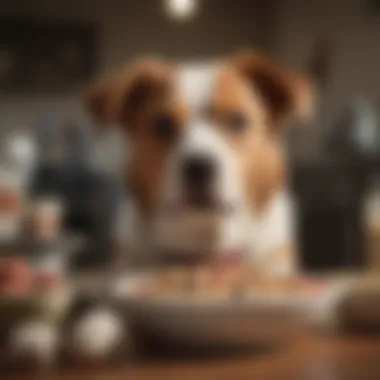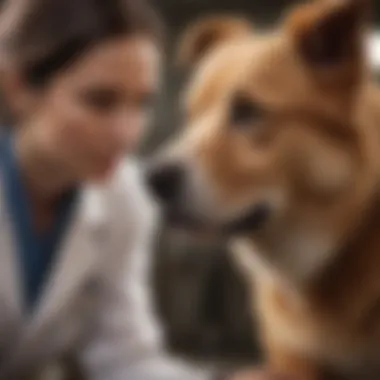What to Do If Your Dog Has Diarrhea: A Comprehensive Guide


Intro
Experiencing diarrhea in dogs can be a concerning situation for pet owners. Understanding the underlying causes and appropriate actions can make a significant difference. With the right knowledge, you can address the issue effectively while ensuring your dog's well-being.
Diarrhea may stem from various sources, including dietary indiscretion, infections, or even stress. It can also signal underlying health problems that require close attention. In this guide, we will look at essential steps to take when your dog shows signs of diarrhea while covering potential causes, home care practices, dietary changes, and when to seek professional help.
Understanding Your Pet
Breed Traits
Certain dog breeds may have hereditary conditions that make them more susceptible to gastrointestinal issues. For instance, smaller breeds such as Yorkshire Terriers or Chihuahuas can develop sensitive stomachs more easily than larger breeds. Knowing your pet’s breed characteristics can provide insight into potential health challenges.
Common Temperaments
The temperament of dogs can impact how they react to stressors in their environment. A nervous dog may experience diarrhea in response to anxiety or changes. Understanding your dog’s personality helps in tailoring a supportive environment that minimizes stress.
Special Needs
Some dogs have special dietary or health needs. For example, dogs with pancreatitis require low-fat diets, while those with lactose intolerance should avoid dairy. Being aware of these special needs can help prevent incidents that lead to diarrhea.
Pet Care Essentials
Nutrition and Feeding Guidelines
Feeding your dog a balanced diet is crucial for maintaining their overall health. High-quality dog food provides necessary nutrients and can help prevent digestive upset. Consider implementing a gradual change in diet when introducing new food. For dogs experiencing diarrhea, a bland diet of boiled chicken and rice may help solidify their stool.
Grooming Tips and Techniques
Regular grooming can also impact your dog’s health. Keeping your dog clean helps maintain hygiene and prevent external irritants that could lead to stomach issues. Be sure to clean their fur and paws after outdoor play, particularly in muddy or unsanitary areas.
Health and Wellness
Routine vet check-ups are essential for monitoring your dog's health. Vaccinations and regular deworming contribute to overall wellness, reducing the risk of infections that can cause diarrhea. Regular use of preventive medication for parasites ensures your dog stays healthy.
Training and Behavior
Basic Training Techniques
Training your dog can improve their behavior and reduce stress. A well-trained dog is often more adaptable to changes in routine, which can help prevent digestive issues arising from anxiety. Use positive reinforcement methods to encourage desired behaviors.
Behavioral Problems and Solutions
Addressing behavioral problems, such as excessive barking or chewing, can help reduce overall anxiety for your dog. Consult a behaviorist if necessary, to identify solutions that can help improve their mental well-being.
Mental Stimulation Activities
Keeping your dog mentally stimulated can contribute to their overall happiness. Activities like puzzle toys or obedience training can redirect their energy positively. A happy dog is less likely to experience stress that contributes to diarrhea.
Engaging with Your Pet
Interactive Games and Toys
Provide your dog with engaging toys that promote active play. These toys stimulate their mind and body, helping them release pent-up energy which may reduce stress-related gastrointestinal issues.
Safe Outdoor Activities
Ensure that outdoor playtime is safe. Supervise your dog during walks to prevent them from eating harmful substances. This attention can help avoid dietary indiscretion which may lead to diarrhea.
Family-Friendly Pet Interactions
Encourage gentle interactions among family members and your dog. Teach children how to treat pets kindly, as a harmonious environment contributes to a dog’s emotional stability.


Pet Adoption and Integration
Choosing the Right Pet for Your Lifestyle
Consider your lifestyle before adopting a new pet. Research various breeds and their needs to find one that aligns with your household. This foresight helps prevent future health concerns that can lead to issues like diarrhea.
Preparing Your Home for a New Pet
Before introducing a new pet to your home, prepare by creating a comfortable space for them. Ensure access to clean water, safe toys, and a cozy resting area. This preparation helps the pet acclimate, reducing the stress that can trigger gastrointestinal problems.
Tips for Smooth Prologue
If you have existing pets, introduce them gradually to avoid stress. Monitor their interactions closely until they are comfortable. A smooth introduction can foster a peaceful household, contributing to better overall health for all pets involved.
Understanding your dog's needs is key to preventing and managing diarrhea.
Understanding Dog Diarrhea
Understanding dog diarrhea is crucial for any pet owner. It is not just about the mess; it can indicate underlying health issues. Recognizing the signs and symptoms helps in timely intervention. For dogs, diarrhea is often a response to various factors, and understanding these can aid in effective management. This section aims to provide clarity on what diarrhea means for dogs, its significance, and the types that exist.
Definition and Symptoms
Diarrhea in dogs is defined as an increase in the frequency, volume, or consistency of feces. When a dog's stools are watery or loose, it denotes a disruption in the digestive process. Common symptoms accompanying diarrhea may include:
- Increased frequency of bowel movements
- Watery, loose stools
- Abdominal cramps or discomfort
- Dehydration, which can be serious
- Lethargy or decreased energy levels
Recognizing these symptoms early on is key. Immediate attention could prevent a more serious health condition from developing.
Types of Diarrhea
Diarrhea can be categorized into two main types: acute and chronic. Each type has distinctive characteristics and implications.
Acute Diarrhea
Acute diarrhea often develops suddenly and may last for a short period. It can result from dietary indiscretion, infections, or changes in food. The key characteristic of acute diarrhea is its temporary nature. Pets usually recover quickly, especially with at-home care. This makes acute diarrhea a common subject in the discussion about dog health. The unique feature of acute diarrhea is its often benign cause, such as eating something they shouldn’t have or a change in their diet. However, it can also lead to dehydration if not managed properly.
Chronic Diarrhea
Chronic diarrhea persists over a longer time, often longer than two weeks. It may suggest an underlying health issue that needs to be addressed. The key characteristic here is its prolonged nature and typically more serious implications. Chronic diarrhea indicates that the body is struggling with nutrient absorption or dealing with a digestive disorder. This type of diarrhea is less common than acute but warrants more significant concern. It may require veterinary consultations for proper treatment.
Understanding these types can allow pet owners to respond appropriately when their dogs face diarrhea issues. Recognizing the difference between acute and chronic diarrhea is essential for determining the right course of action.
Common Causes of Dog Diarrhea
Understanding the common causes of dog diarrhea is essential for effective management. Diarrhea can arise from various factors, ranging from diet to serious health concerns. Addressing the root of the problem can prevent further issues. This section dissects several primary causes, helping pet owners make informed decisions and take appropriate actions.
Dietary Changes and Indiscretion
Diet plays a significant role in a dog's digestive health. When owners switch food brands abruptly, it may shock the digestive system, leading to diarrhea. Similarly, if a dog consumes something unusual, like table scraps or a foreign object, this can cause upset stomach.
Some dogs are especially sensitive to certain ingredients. A gradual transition to new food can help mitigate this issue. It’s important to monitor what your dog eats to prevent unnecessary digestive distress.
Infections and Parasites
Infections and parasites are another major cause of diarrhea in dogs. They often require veterinary intervention. Its crucial for dog owners to recognize and understand these threats to ensure timely treatment.
Bacterial Infections
Bacterial infections can disrupt the normal flora of a dog’s gut. Common bacteria such as Salmonella or E. coli may lead to inflammation and diarrhea. The distinctive characteristic of bacterial infections is their contagious nature, meaning an infected dog can spread it to others. This highlights the importance of sanitation and hygiene. Addressing bacterial infections typically involves antibiotics, which may solve the issue quickly.
Viral Infections
Viral infections like Parvovirus or Distemper can also induce severe diarrhea. These conditions are often serious and may require immediate veterinary care. A key trait of viral infections is the systemic impact they have on the dog's immune system. Many viruses can be prevented through vaccinations. Thus, staying up to date with vaccines is a crucial protective measure for pet owners.


Parasites
Parasites, such as Giardia or roundworms, are yet another source of gastrointestinal distress. Their presence can lead to nutrient malabsorption, contributing to diarrhea. The primary aspect of these parasites is their ability to reside within a host while causing significant harm. Routine fecal exams can help in early detection and treatment. Failing to address parasite issues can lead to more severe health problems over time.
Underlying Health Conditions
In some cases, diarrhea can signify underlying health conditions. Issues like pancreatitis, liver disease, or inflammatory bowel disease often present with this symptom. Understanding these conditions is critical. A veterinarian can provide necessary diagnostics for proper treatment. Tracking your dog’s overall health can help in addressing these concerns before they escalate.
Immediate Steps to Take at Home
When a dog exhibits diarrhea, the initial actions taken at home are critical. These steps can help determine the severity of the condition and can provide relief to your pet in a timely manner. Understanding the immediate steps not only promotes a faster recovery but also helps pet owners gain confidence while managing their dog's health. Below are key elements that should be considered during this process.
Assessing the Severity of Diarrhea
Determining how serious a case of diarrhea is involves observing your dog closely. You should note the frequency of bowel movements and the characteristics of the stool. Key signs to look for include:
- Consistency of stool: Is it watery, soft, or formed?
- Frequency: How often does your dog need to go outside?
- Accompanying symptoms: Are there any other signs, such as vomiting, lethargy, or loss of appetite?
Use this assessment to inform your next steps. If the diarrhea is occasional or mild, home care may suffice. However, severe or persistent diarrhea may warrant further attention.
Fasting Your Dog
Once you assess that the diarrhea is manageable, consider a short fasting period. This method can ease the digestive system and allow it to reset. Typically, a fast of 12 to 24 hours is appropriate for most adult dogs. While fasting:
- Ensure your dog has access to fresh water to prevent dehydration.
- Monitor your dog's behavior; if they appear sluggish or weak, reconsider the fasting approach.
Fasting should not be applied indiscriminately. Puppies and older dogs, for example, might be at risk for rapid health decline during fasting periods. Always customize the approach based on your dog's age and overall health.
Hydration: Ensuring Fluids
Hydration is perhaps the most crucial element during your dog's diarrhea recovery. Diarrhea can quickly lead to dehydration, which, if not addressed, may become life-threatening. To keep your dog hydrated:
- Provide fresh water: Ensure your dog has access to clean water at all times.
- Consider electrolyte solutions: In some cases, offering a bland electrolyte solution designed for pets can be beneficial. This helps replace lost minerals and maintain salt balance.
- Monitor intake: Keep track of how much your dog is drinking. If they refuse water or show signs of excessive thirst, seek veterinary advice.
Note: The first step in recovery is ensuring proper hydration; ignoring it can lead to complications.
These steps are essential for pet owners to take when dealing with diarrhea. Following these immediate measures sets the stage for recovery, while thorough observation ensures that you take appropriate action for your dog's health.
Dietary Adjustments During Recovery
Dietary adjustments play a crucial role in managing a dog's recovery from diarrhea. A balanced diet can help restore the gut's natural function and ensure the dog regains its strength. It's essential to approach this transition carefully. Understanding what to feed your dog during this phase can significantly affect its recovery process.
Intro to a Bland Diet
When a dog experiences diarrhea, one of the recommended initial steps is to introduce a bland diet. This diet typically consists of easily digestible foods, which can help reduce gastrointestinal irritation. Common options for a bland diet include boiled chicken without skin, white rice, or plain pumpkin. These foods are gentle on the stomach and help firm up loose stools.
The main benefits of a bland diet are:
- Easily digestible: Simple ingredients can minimize stress on the digestive system.
- Reducing inflammation: Helps calm down any intestinal discomfort.
- Replenishing nutrients: Provides necessary energy without overwhelming the gut.
However, it's essential to consider that any sudden dietary changes may further irritate your dog's intestines. Therefore, proceed with caution and observe your dog for any negative reactions.
Reintroducing Regular Food Gradually
After a few days on the bland diet, once the dog's condition stabilizes, it's time to reintroduce regular food. This process should be gradual. Starting with small portions of the dog's regular diet can help assess if the dog's stomach is ready to handle it.
Consider the following steps:
- Start Slow: Mix small amounts of their regular food with the bland diet, then slowly increase the regular food portion over several days.
- Observe Reactions: Monitor for any signs of discomfort or diarrhea as you increase the regular diet.
- Maintain Hydration: Ensuring your dog has access to fresh water remains essential during this transition.
By taking these steps, you can safely return your dog to its regular eating routine while minimizing the risk of a relapse or further gastrointestinal issues.


Proper dietary adjustments can be a deciding factor in your dog's recovery from diarrhea. Always prioritize their comfort and health during this time.
When to Consult a Veterinarian
Knowing when to seek professional help is crucial for the health of your dog. Diarrhea can be a common issue, yet its underlying causes may vary significantly, from mild dietary indiscretions to serious health concerns. It is essential for dog owners to observe their pet's condition closely and understand the signs that necessitate a visit to the veterinarian.
In severe cases, delaying veterinary care can lead to complications, including severe dehydration or overlooked illnesses. By consulting a veterinarian at the right time, proper diagnosis and timely treatment can prevent further health deterioration. Understanding the indicators is the first step for a responsible dog owner in managing their pet's well-being effectively.
Signs That Require Immediate Attention
Several warning signs signal that you should take your dog to the veterinarian without delay. These include:
- Bloody Diarrhea: The presence of blood in the stool can indicate a serious health issue.
- Persistent Vomiting: Frequent vomiting alongside diarrhea raises concerns about dehydration or intestinal obstructions.
- Listlessness: If your dog shows signs of lethargy or is unresponsive, it's critical to seek help.
- Abdominal Pain or Swelling: If your dog shows discomfort or has a swollen abdomen, these symptoms should be evaluated by a vet.
- Loss of Appetite: A sudden and prolonged lack of appetite can indicate underlying problems.
- Excessive Thirst: Increased water consumption can signal dehydration or kidney issues.
- Age and Health of the Dog: Puppies, older dogs, or those with pre-existing health conditions require more immediate attention compared to healthy adults.
If your dog exhibits any of the aforementioned signs, do not hesitate to seek veterinary assistance.
Understanding the Diagnostic Process
When consulting a veterinarian, it's helpful to understand what to expect during the diagnostic process. The veterinarian first conducts a thorough examination, evaluating your dog’s physical condition, including checking vital signs and overall health. They may ask detailed questions about your dog’s recent diet, behavior changes, and any accompanying symptoms. This information helps narrow down potential causes.
Diagnostic tests might include:
- Stool Analysis: Checking for parasites, bacteria, or signs of infection.
- Blood Tests: These can reveal underlying infections or organ dysfunction.
- X-rays or Ultrasound: Imaging tests might be needed to examine internal organs for abnormalities.
Every step in this process is aimed at discovering the root cause of the diarrhea. Understanding this can ease owners' anxiety and help them provide accurate information to the veterinarian, leading to more effective treatment for their pet.
Preventive Measures for Future Incidents
Preventive measures are critical in managing your dog's health and well-being. Understanding how to avoid diarrhea can help maintain not only their digestive health but overall quality of life. Preventing issues before they arise is often more effective than attempting to treat conditions after they have developed. Focusing on certain key elements can be beneficial in protecting your dog from future incidents of diarrhea.
Maintaining a Balanced Diet
A balanced diet is fundamental to your dog's health. Providing high-quality food equips your dog with the necessary nutrients for proper functioning. Dogs require a combination of proteins, fats, carbohydrates, vitamins, and minerals for optimal health.
When selecting dog food, consider the following:
- Opt for food specifically designed for dogs that mentions nutritional adequacy on the label.
- Avoid sudden changes in diet. Gradually introducing new food can reduce gastrointestinal upset.
- Monitor your dog for any food intolerances or allergies. Symptoms can include diarrhea, vomiting, or bloating.
Regular consultation with your veterinarian can help identify the best diet tailored to your dog's specific needs.
Regular Veterinary Check-Ups
Continual health monitoring through regular veterinary check-ups is essential. Routine examinations can catch potential health problems before they escalate, leading to conditions such as diarrhea. During these visits, veterinarians can provide vaccinations, parasite preventives, and nutritional guidance tailored to your dog.
Consider the following for veterinary visits:
- Schedule check-ups at least once a year, or more frequently for older dogs or those with chronic health issues.
- Discuss your dog's diet, behavior, and any changes in their health with the veterinarian.
- Ensure your dog is up-to-date with vaccinations to protect against diseases that can cause gastrointestinal issues.
Protecting Against Parasites
Parasites pose a significant risk to a dog's digestive health. Flee and ticks, along with intestinal worms, can cause severe health problems, including diarrhea. Maintaining a routine parasite prevention plan can help safeguard against these threats.
To protect your dog, consider the following:
- Use veterinarian-recommended flea and tick prevention products.
- Implement a deworming schedule as directed by your vet, especially for puppies and dogs who spend time outdoors.
- Regularly check your dog for signs of parasites, which can include weight loss, bloating, or changes in bowel movements.
By being proactive with preventive measures, you contribute greatly to your dog's long-term health, reducing the likelihood of diarrhea and other related issues.
The End
In summarizing the overall guidance on managing dog diarrhea, it is vital to recognize that this condition, while often temporary, can signal underlying health issues or dietary mishaps. Understanding the many factors contributing to diarrhea in dogs helps pet owners take the necessary, timely actions to support their pet’s recovery. Moreover, knowing the dietary adjustments and home care practices can be instrumental in easing your dog's discomfort.
A significant element in this guide has been recognizing when to seek the help of a veterinarian. The symptoms that necessitate a professional's intervention include excessive vomiting or blood in the stool, among others. These signs should never be overlooked, as they could indicate more serious complications.
Additionally, preventive measures are crucial in maintaining your dog's health. Regular veterinary check-ups and protecting against parasites can help minimize the risk of future incidents. Teaching and maintaining a balanced diet becomes essential in preventing dietary indiscretion that may lead to diarrhea.
Key Point: Proper knowledge equips pet owners to handle dog diarrhea effectively, ensuring your furry friend receives the appropriate care they need during recovery.
Ultimately, the steps outlined throughout this article provide a framework for pet owners to utilize when faced with this common issue. By understanding the symptoms, causes, and necessary actions, caregivers can uphold the well-being and comfort of their beloved companions. Maintaining attentiveness to both symptoms and preventative care ensures not just recovery but a deeper bond between pet and owner, characterized by health and mindfulness.



